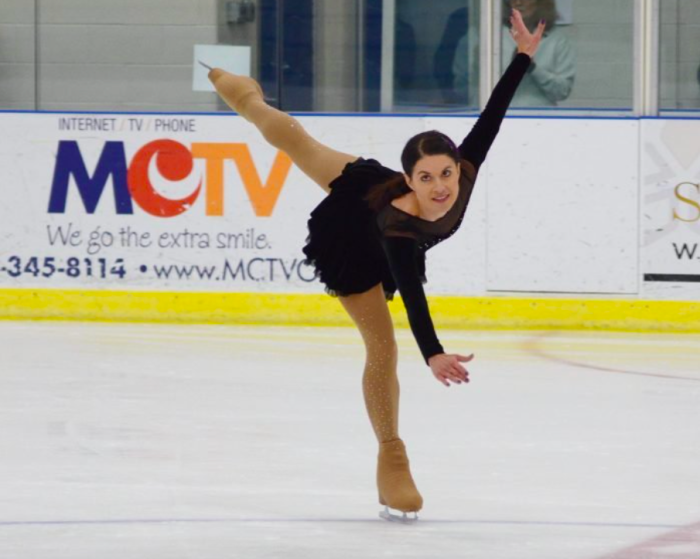My bowels were like ice and my salivary glands seemed to be on vacation, but I knew if I drank water, it would immediately go through me. A quick trip to the powder room wasn’t an option.
Impractical as a wedding dress, I was wearing layers of complicated clothing that had to be systematically taken off, unbuttoned, or pulled down in reverse order. Visions of amber liquid running down my leg in front of the audience of hundreds, maybe thousands, went skating through my head.
When the announcer finally called our team and I heard the ensuing stomping, clapping, yelling, whistle-blowing, rattle-shaking of the crowd, my heart felt like a toad trying to jump out the bottom of a well.
The six months of practice, bruised knees, and learning routines only to unlearn them as the choreography changed was my choice, I reminded myself. This wasn’t the Olympics, after all. It was a fun competition between adult figure skaters.
Except that it was Theatre on Ice Nationals, not some small local event, and we were only given one minute to warm up before getting into our starting position. For an adult over 40 who’d never skated as a child, it was barely enough time for my body to register that it was moving across ice with four-millimeter blades on the bottoms of my boots that were sharp enough to slice a carrot.
As we took our positions and waited for the music to start, I remembered to use the HeartMath™ technique to calm my nervous system. Breathing deeply and slowly through my heart, I evoked a sense of gratitude for the salesman, pediatric nurse, registered dietician, speech pathologist, retired parole officer, and other intelligent adults with busy lives who were now on the ice with me.
The Power of Reclaiming a Childhood Dream
When I’m stuck in a rut due to stress and overwhelm, learning something new has often proved to be the perfect antidote. Learning to skate as an adult has proven to be particularly powerful because it’s something I’d wanted to do from a young age.
I remember watching the Olympics, barely breathing as I saw girls in sequined, brightly-colored costumes executing jumps and spins with the grace of a ballerina and the power of a Derby horse. They were beautiful and strong, like She-Ra and Wonder Woman. Katarina Witt and Kristi Yamaguchi were superheroes to me, and I longed to be one of them.
When I asked my mother about it, she reminded me that we were in the middle of nowhere in southern Indiana, miles from a rink and my great-grandma fell and hit her head while ice skating on a pond, causing permanent damage to her optic nerve. At age 16, she started to go blind. By the time I knew her, she could only see shadows.
So no, I didn’t skate as a child or a teenager. Not even once. Apparently convinced that I couldn’t get a traumatic head injury doing flips through the air, my mom enrolled me in gymnastics instead.
When I started skating, I was a 39-year-old working in a high-level position that gave me insomnia from trying to do more in a day than was humanly possible. One of my employees suggested ice skating at the local outdoor rink for our winter holiday party. I took to the ice like a baby bird takes to the air: a little tentative and awkward at first, but it soon felt natural.
I quickly figured out how to skate backward by moving my hips and using the inside edges of my blades. Stopping took a bit longer to learn, but hey, that’s what the walls are for. I soon signed up for group lessons and then started taking private lessons. My first jump felt like flying and I was hooked. Several years later, I started competing.
I am proof that adults are capable of learning complicated things at an older age. My grandma, who learned to paint at age 70, was part of the inspiration to try my hand (or foot) at ice skating.
Thanks to skating, I’m in better shape in my 40s than I was in my 20s. Although it’s excellent exercise, it feels more like play than work, allowing me to maintain my fitness with ease throughout my middle years.
Skating has also had a positive impact on me psychologically, helping me maintain my sanity on the never-ending hamster wheel of life and bills, fluctuating hormones, and the overall unpredictable state of the world.
Three Big Benefits of Trying Something New
1. Learning new things keeps the brain fit.
Your brain develops neural networks that didn’t previously exist, increasing its neuroplasticity. Since the brain loves novelty, you’ll get an energizing shot of dopamine. Add the serotonin boost that comes from a novel physical activity, and we have a balancing feel-good cocktail, which is particularly helpful for getting through the cold, dark months of winter. My friends who ski, snowboard, and mountain bike all report similar benefits.
2. One-pointed focus slows down the chaotic activity of “monkey mind.”
You need intense focus when learning new things. Even now, if I lose focus while skating, my ass ends up on the ice, a painful reminder to stay present! When you are forced to be in the here and now, your mind can detox, making room for more joy and creativity.
3. You become part of a wider community that has meaning for you.
As an adult, it can be more challenging to make new friends beyond coworkers or the parents of our children’s friends. When I moved to Durham, North Carolina, I got plugged into the adult skating community and quickly found support and friendship during a challenging time.
(If ice skating isn’t your jam, don’t worry. You can still reap these benefits by trying something new, especially if it’s something you’ve dreamed about for a while now.)
Try This
Grab a pen and paper and find a quiet place where you won’t be disturbed. Sit in a comfortable position, take a few deep breaths through your belly to activate that vagus nerve, and then think about the things you enjoyed as a child.
Write those things down, even if they seem silly or unimportant to you. Maybe you loved soccer or playing video games, but perhaps you enjoyed less mainstream things, such as foraging for morels. Think about some of those strange obsessions, your daydreams, your hobbies. Write down all of it.
What did you love about those things? Did they appeal to your competitive nature? Your love of the natural world? Your need for artistic expression?
For example, I always loved writing and spending time in nature, but I was also strangely obsessed with swinging on the swing set. I now realize it was a self-soothing mechanism for my sensitized nervous system that also provided the space for my creative mind to daydream. Skating, particularly spinning, provides a similar benefit.
What you gravitated to as a child, from sports to books to special interests, can be your key to healing because incorporating those things in your life on some level can help you find meaning again. Connecting with others who have similar interests will give you a sense of true community, whether you’re a recent college graduate or an empty nester.
I jokingly refer to skating as my midlife crisis, but there was power in finally doing something I’d wanted to do ever since I was a child.
Sure, I’ll never compete in the Olympics or even do a double axel, but I’ve found an outlet that relieves stress, connects me to like-minded people, keeps me in shape, and allows me to express myself artistically.
And that is worth more than Olympic gold.












Read 21 comments and reply